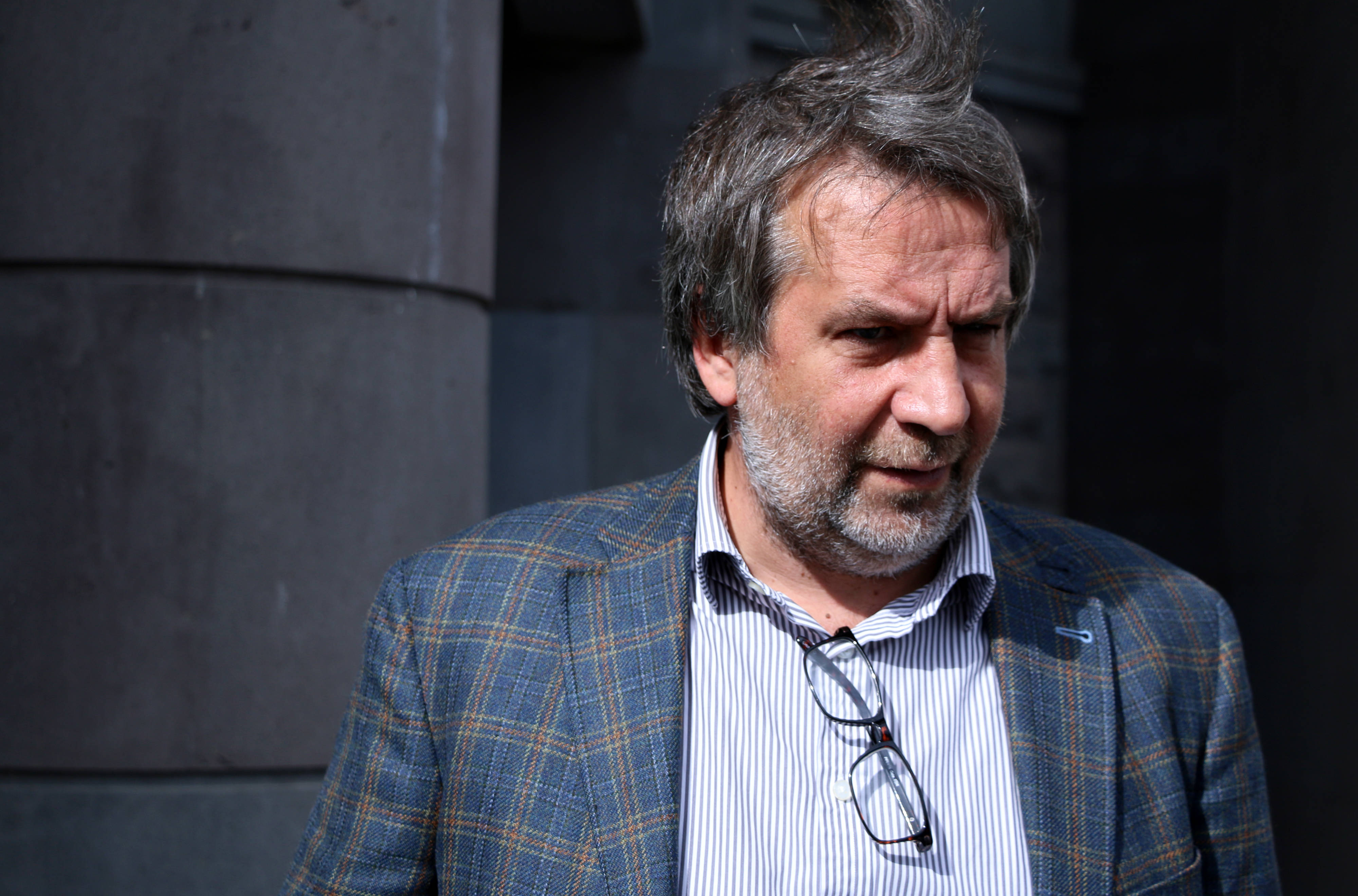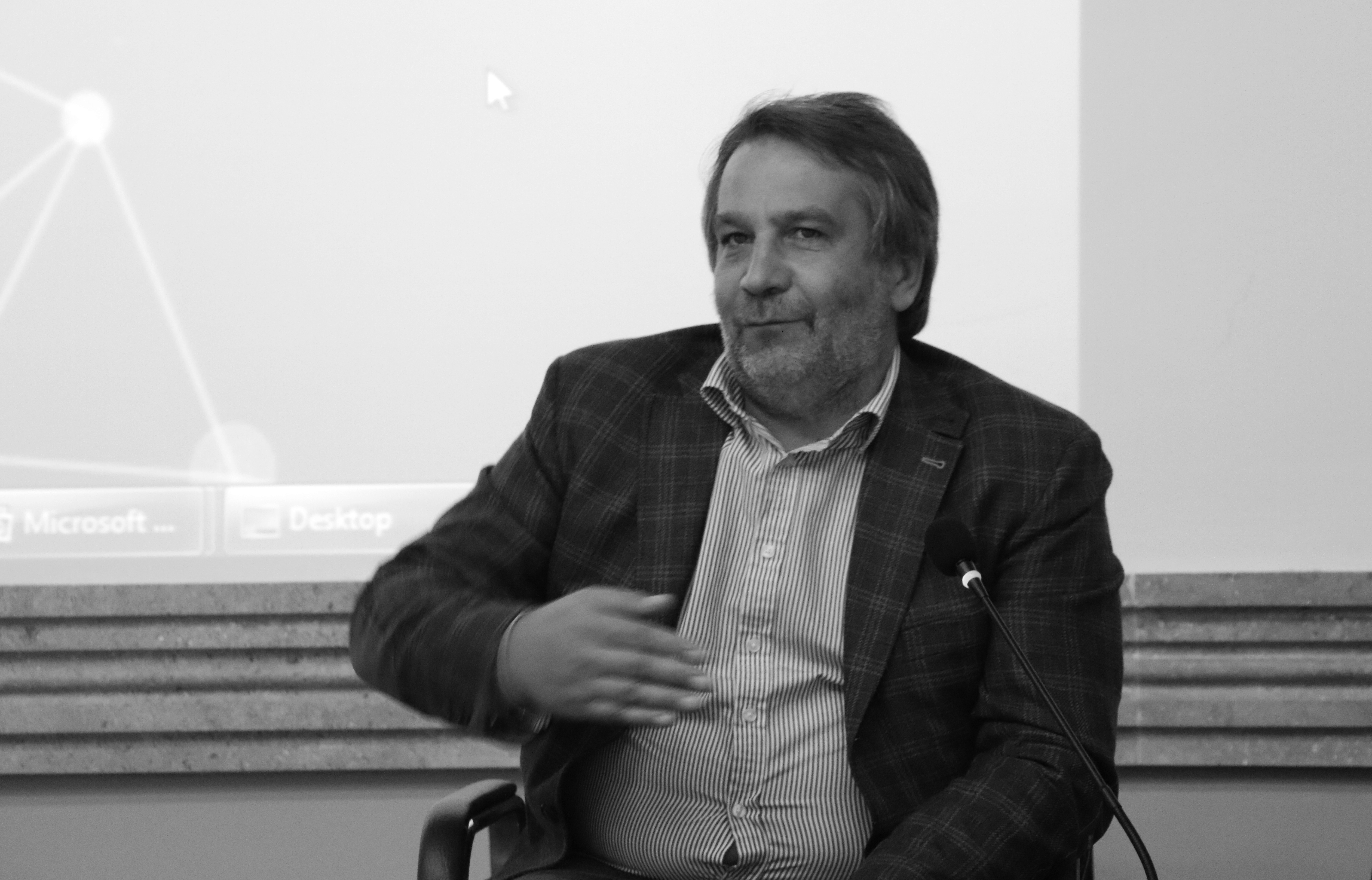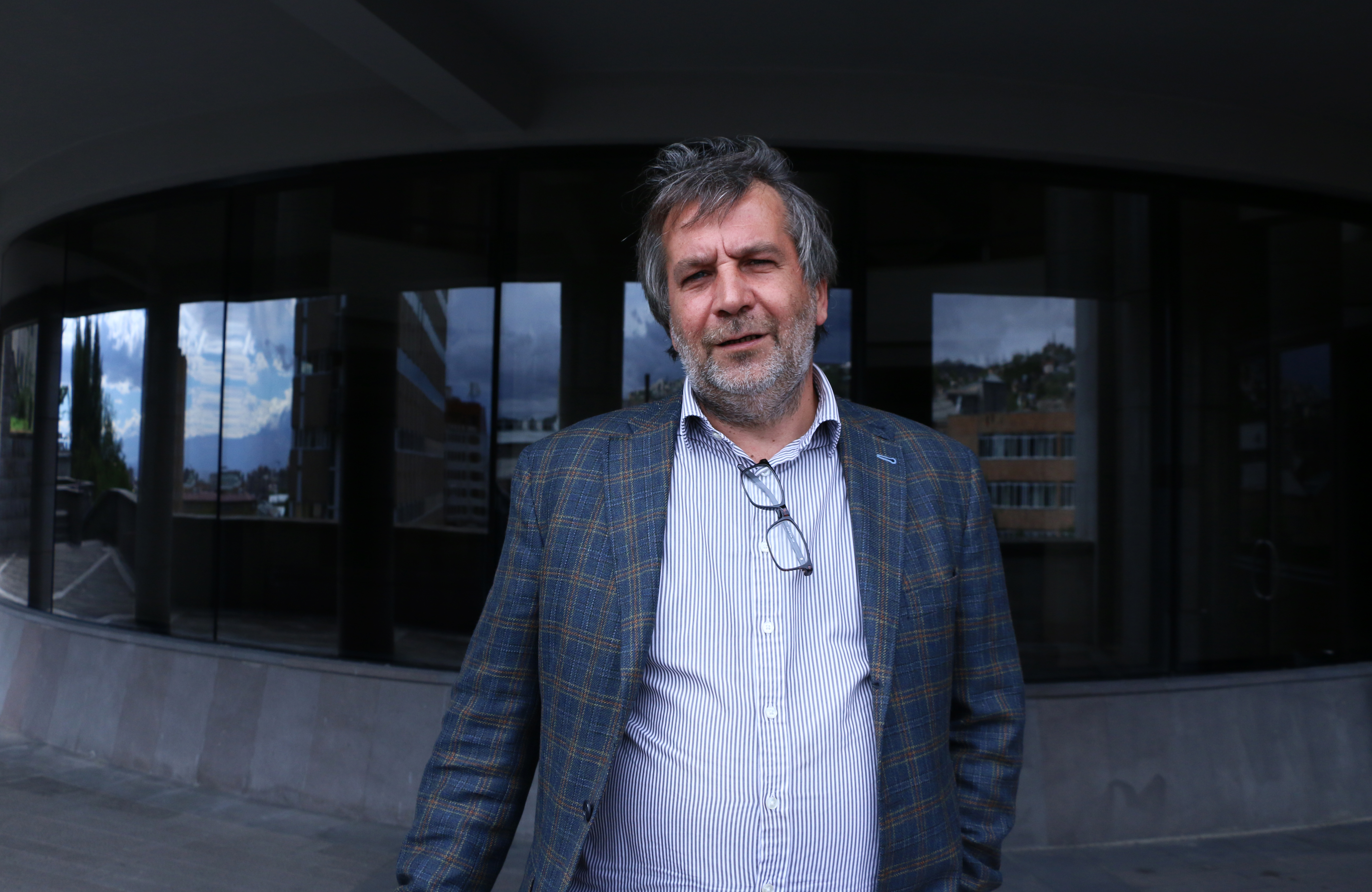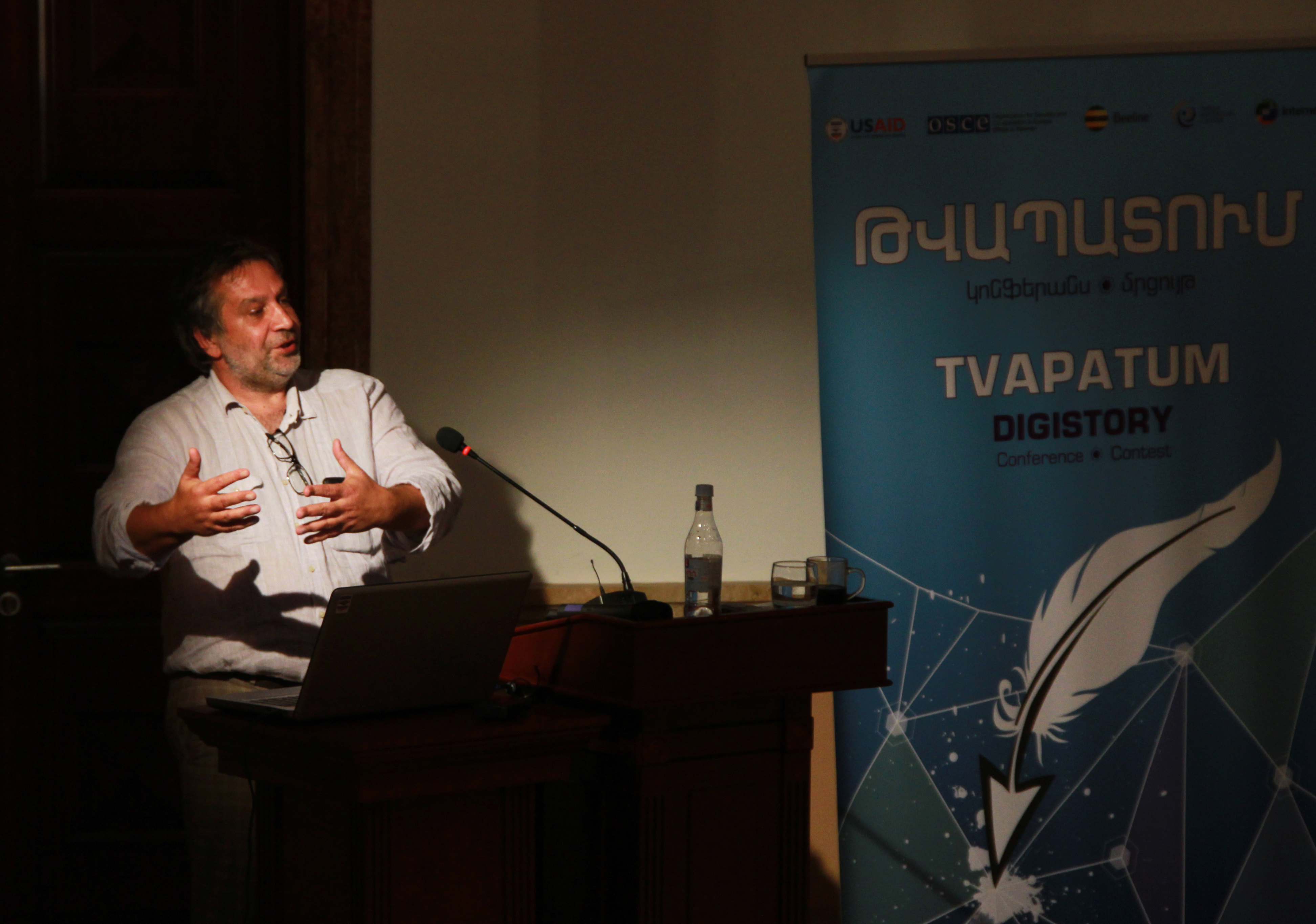
Media analyst, journalist, manager and futurologist Vasily Gatov studies today’s media arena and the reality when lies and the truth are hard to recognize. He uses the term “post-truth” to explain that manipulative media techniques are not so much based on lies as on the implication that the truth does not matter.
The media and politicians often lie (they’ve always lied and will lie); the issue is that for the public, it makes no difference whether they tell the truth or not.
Gatov is an employee of the University of Southern California’s Annenberg Center on Communication Leadership and Policy; he provides lectures and reports, and tries to forecast how the media will be transformed. At the Tvapatum (“DigiStory”) media conference in Yerevan last month, he presented his research on the media of the future, new trends, and the messages hiding behind journalistic texts.
And since we now live in a reality when what’s given importance are the decisions and steps taken after learning the truth, we spoke with Gatov about different manipulative media attacks, which if we can distinguish them, might ultimately help not to go astray in the period of post-truth.
Propaganda plays a big role in almost all countries’ news. How fine is the boundary between dry facts and directed information?
It’s impossible to talk about propaganda easily. To understand and describe it, you must take into account both historical incidents and modern means of communication; that is, what is happening now in mass media and in the field of interpersonal and group communication.
There’s also the projection aspect, which helps to understand what might happen if we don’t find the means to counter propaganda.
The analysts who dealt with these issues before us and the politicians concerned about campaigning were able to explain and describe how propaganda works. But the problem is that those lessons were learned quite poorly. In some sense, the story of propaganda is like the habit of standing on a rake over and over again.
We can recall some names: Arthur Ponsonby, who wrote about military propaganda in his famous book Falsehood in War-Time, and Institute for Propaganda Analysis co-founder Clyde Miller, who developed the seven principles of propaganda.
We’ve simply forgotten that all the propaganda tools (rhetorical components, methods of manipulation, and so on) were identified, studied, and described long before World War II. By and large, postwar communication theory has added very little to what already existed.
Standard, Goebbelsian propaganda hasn’t gone anywhere and has a practical impact.

Do the methods of mass communication likewise work according to Goebbelsian principles?
Propaganda’s new momentum is linked to the appearance of television. Television supplemented propaganda with emotions. Of course, radio also deals with emotions, but radio, to put it objectively, doesn’t make money.
But television makes money thanks to soap operas, extremely emotional talk shows, and infotainment. The news is turning from information of public importance to entertainment.
The new reality was analyzed from 1960–1980, including also by the Annenberg Center on Communication Leadership and Policy. George Gerbner, Larry Gross, Denis McQuail, and other experts distinguished the new elements of media manipulation.
If propaganda is the application of strong media effects (for example, framing, priming), then the weak effects were also found. This is, first of all, of course agenda setting.
Does television only set or also create the agenda, by setting the priority of news?
Television can subconsciously create an agenda. This is how it is, for example, in American commercial television broadcasting: there’s neither a chairperson of the board nor a press secretary who can call and say this has to be on air and this not.
Whereas in other cases, agenda setting happens consciously and in a mediated fashion. Taken into account is what place some news or another occupies in the overall newsfeed; achieving great significance are editors’ opinions and hosts’ attitudes, speaking styles, rates of speech, and so on.
There are many direct and more effective examples of manipulation especially in Russian television. They were seen quite vividly during the protest demonstrations in Moscow, when the main news broadcasts looked like this: Putin went, Putin met, Putin passed by the river, Putin entered the river.
At the time, Putin was everything and everywhere, even in the weather forecasts. And this is no longer agenda setting but direct manipulation, when certain topics are left out of the newsfeed and certain topics are forcibly included in the agenda — without considering whether they have public significance or not, whether they’re interesting or not.

This was done because that’s how the authorities wanted it, believing that this way, they reinforce their stability and reduce the possibility of opposition influence.
And what is the audience’s faith in television based on?
More recent studies discovered the oxytocin-cortisol issue. That is, the chemical explanation was propounded.
In recent years, there have been great strides in the study of the brain, and it became clear that many of the media effects familiar to us and already described (propaganda theory, the mechanisms of agenda setting; also, cultivation theory) cause changes in the brain — at a biological level.
This was first intuited by the creator of cognitive dissonance theory, Leon Festinger, who declared that everything is based on chemistry.
Almost 60 years was required for that chemistry to become visible. Of course, it was known that the work of the brain governs the hormones. Serotonin, for example, had been discovered, but the role of oxytocin and cortisol was still being clarified.
The creation of the instrument that measured these hormones greatly contributed to the discovery. In the past, several days were required to measure hormone levels, but now salivary output detectors measure hormonal fluctuations almost in real time, with a delay of only a few minutes.
Does this mean that media effects — to put it crudely — are drugs?
There’s no problem to put it crudely — that’s, in fact, how it is. When we consume a propaganda media product, what happens in our brain are exactly those changes that would happen if we used weak hallucinogenic drugs.
What can we do, that’s how the connections in our brain work: that if you have your truth, while another truth pierces your brain through television, you can only choose one option.
Reduction is either toward real life or toward virtual, television.
And so that the brain chooses virtual life, put to work is the tool that is traditionally found in conspiracy theories. The media constantly prompts the audience that it’s not told the entire truth. For example, who killed President Kennedy is kept a secret, or it’s said that there’s no proof that the Americans were on the moon.
This too is the problem of truth and post-truth, which I talk about often.
The moment when as a consumer of information you feel that there is a direct contradiction between what you personally saw (with your own eyes), heard (with your own ears), or touched (with your own hands) and the claim that contradicts it, that “everyone knows about this,” and that’s it…
From that moment on, only the “off” button will help you. Turn off the TV. This is the only remedy.

During the conference you said that mass media stopped being a client of new technologies; it didn’t order, for example, the internet. Can it be said that mass media has reduced its order of serious journalists?
Of course it can’t be said like that. Journalism is like a large umbrella under which various professions dealing with information have gathered.
And some of these professions are based on the idea of a mission.
There exists a social contract between mass media and the public. And it makes no difference how that society is (there can also be a totalitarian regime). All the same, in all situations, the two parties agree that journalists are obliged to inform, analyze, cover, illuminate, and also alter the cultural arena of language, which is modernized with each content.
Yes, today, not literature, but the news modernizes language.
No one can rule out the idea of this mission.
Of course, there exist popcorn and Gonzo journalism, which have nothing to do with mission and responsibility. By the way, they can have a very beautiful appearance, pleasant form, and actually be absolutely true (that is, address problems that don’t contradict reality). But along with that, whether you read those stories or not, nothing will change. The majority of news pieces in glossy magazines is exclusively popcorn; that is, useless in terms of perspective.
There also exists a third group of journalistic occupation: that’s propaganda, which pretends it’s journalism. It can adopt the format of traditional investigative journalism or even glossy magazines to create the impression that it’s journalism. Whereas, in fact, it’s pure propaganda.
In Armenia, and I think also in Russia, the journalist profession is quite discredited. It’s an unpleasant situation…
It’s like that in the entire world, with the exception of a few countries where the history of the media is the history of democracy of those countries. Moreover, the media was an important battlefront, through the help of which basic knowledge on civil rights, freedom of speech, and politics was constructed.
As experience shows, the situation of discredited journalism is surmountable. Some time later, the figures of bad and corrupt journalists are forced out thanks to those who do their work professionally, honestly, and responsibly.
And now, when post-truth has appeared, that is, the direction of the truth that comes after the fact, the role of journalists has increased.
On one hand, all countries’ politicians are used to saying I’m bad, but see how worse my competitors are. It suits them to spread the idea that if they won’t be the holders of power, then absolute monsters will (in Russia, for example, they say, if not Putin, then the cat).
On the other hand, we see that consumers are frustrated, they’re psychologically unable to meet their expectations, and they experience strong negative emotions.
And so, good journalists are very much in need.
Interview by Nune Hakhverdyan


Add new comment
Comments by Media.am readers become public after moderation. We urge our readers not to leave anonymous comments. It’s always nice to know with whom one is speaking.
We do not publish comments that contain profanities, non-normative lexicon, personal attacks or threats. We do not publish comments that spread hate.